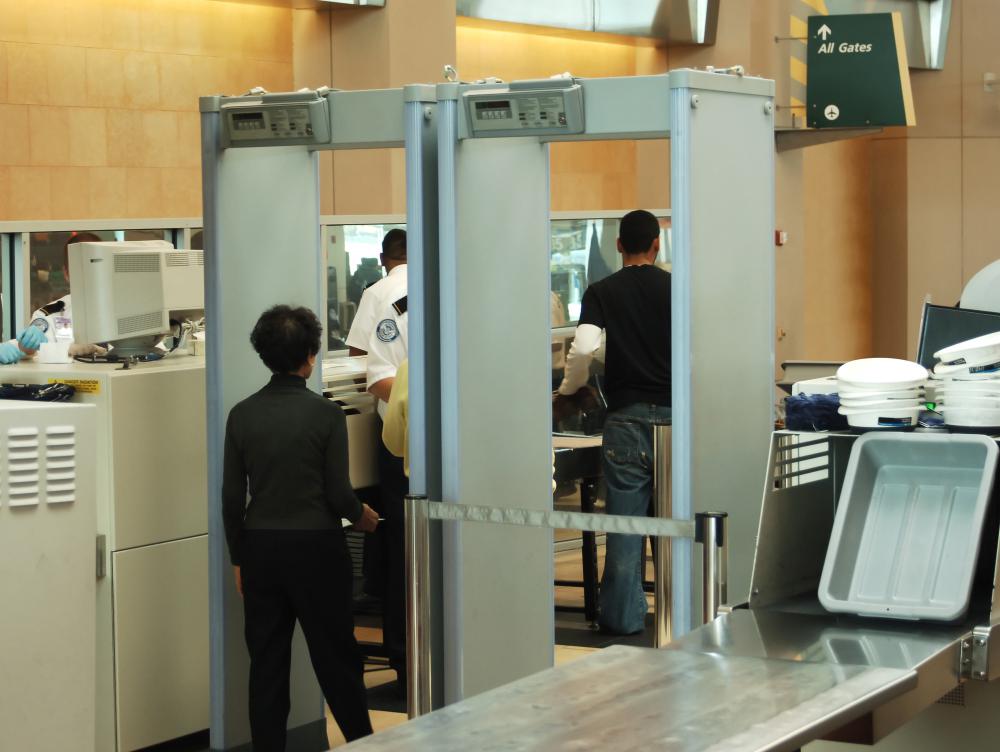At WiseGEEK, we're committed to delivering accurate, trustworthy information. Our expert-authored content is rigorously fact-checked and sourced from credible authorities. Discover how we uphold the highest standards in providing you with reliable knowledge.
What is the Best Way to Travel with a Musical Instrument?
Traveling with musical instruments has always been challenging, but especially so after increased security restrictions on most airlines after 2001. Fortunately, many airlines have worked with professional associations of musicians to set up guidelines for traveling with musical instruments to make the process easier. The most important thing you can do when traveling with a musical instrument is to contact the airline you intend to use and discuss the situation with them, so that you clearly understand the airline's policy. If one airline cannot meet your needs, choose another one, and let both airlines know why you made that choice.
If an instrument fits within carry-on restrictions, it can be carried into the cabin. Like other carry-on items, it will be subject to screening, and you should also take care to package it well in order to prevent damage while you are traveling. If the instrument is too large for carry-on allowances, most airlines will allow you to purchase a second seat for your instrument. This is especially recommended for instruments which are fragile, valuable, or stringed. When you contact the airline to book a seat, inform the agent that you will be bringing an instrument on board, and make sure that the instrument will fit on the type of aircraft that you will be traveling on. Use sturdy packaging such as a hard case to protect it, and bring straps to secure it to the seat during the flight.

You can also check a musical instrument, although you should pack it extremely well, and include repackaging and handling instructions in the instrument case so that if it is opened for inspection, security staff can secure it again properly. Ideally, you should be present while the instrument is examined, so that you can ensure safe repacking. You should always check maintenance tools like fluids, reeds, brushes, bows, and other errata for traveling, so that you will not be delayed while going through security. Be aware that especially large or heavy instruments may be subject to an excess baggage charge.

When you are traveling with a musical instrument, plan on arriving at the airport early, and bring airline documentation about traveling with musical instruments with you. Make sure to stay calm and reasonable with airline personnel, who are only trying to ensure the safety of their aircraft. Expect x-rays or a physical examination of your instrument, and work with security personnel to make sure that your instrument is cleared quickly and smoothly. Try to think ahead and request a seat in the back of the plane, allowing you to board early with your instrument so that you have time to secure it properly, and cooperate with requests made by airline personnel. In a worst case scenario, you may be asked to either check the instrument or take another flight, but if you plan ahead and remain calm, this will be unlikely.
AS FEATURED ON:
AS FEATURED ON:












Discussion Comments
@Iluviaporos - I admire that kind of attitude but I think it only gets you so far. The problem is that, if you do get stopped, you will end up with an instrument put in the baggage area that might get damaged. There are times when I would take that risk, but if the instrument was really important or valuable, I think I would just pay for it to travel properly.
@MrsPramm - OK, this might be a risk, but in my experience the best way to get a musical instrument overseas is to just not ask for permission.
I traveled through West Africa with a friend of mine and he wanted to bring home a couple of massive Kora harps. These things are about as tall as the average person and made from leather, wood and a calabash gourd.
I agreed to take one and he took the other on separate flights. I was visiting friends on my way home so I took that massive thing on something like five different flights to get it home. At no point did I ask if I could take it on the plane, I just did it. Every time I ended up on the actual plane the steward would just take it from me and put it in a special locker they had for instruments.
I actually couldn't believe how easy it was, but this was post-9/11 so it wasn't like I wasn't going through all the usual security. I think, with most kinds of adventure travel you just have to assume that no one is going to stop you and they rarely will.
I would be extremely cautious about traveling with a musical instrument, especially if it's a delicate one. I was traveling with a group once on one of those traveling tours and one of the people wanted to bring his guitar on the plane, but they made him check it at the ticketing stand. He couldn't afford to get a box for it that would protect it properly and it was cracked when he picked it up on the other side of the journey.
Luckily it wasn't the most expensive thing in the world, but a ton of musical instruments cost so much I would never dare to try and bring them overseas.
Post your comments